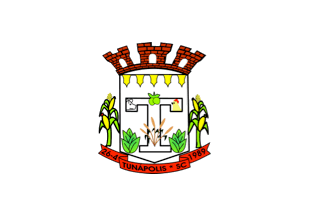 image by
Ivan Sache,
8 November 2021
image by
Ivan Sache,
8 November 2021 
Last modified: 2021-12-11 by ian macdonald
Keywords: santa catarina | tunápolis |
Links: FOTW homepage |
search |
disclaimer and copyright |
write us |
mirrors
 image by
Ivan Sache,
8 November 2021
image by
Ivan Sache,
8 November 2021
The municipality of Tunápolis (4,633 inhabitants in 2010; 13,291 ha) is
located on the border with Argentina, 700 km west of Florianópolis.
Tunápolis originates in the district of Tunas, established by Municipal Law No.
2 promulgated on 11 February 1961.
After a difficult struggle, the
municipality of Tunas was established by State Law No. 7,583 promulgated on 26
April 1989.
The name of the municipality was soon changed to Tunápolis since
a district of the same name already existed in Rio Grande do Sul; four names was
submitted to public vote: Tunápolis, Nova Tunas, Itunas, and Tritunas.
Ivan Sache, 8 November 2021
The flag and arms of Tunápolis are prescribed by Municipal Law No. 191
promulgated on 16 December 1992.
Appendix I.
Coat of arms.
Descriptive memoir.
The design selected for the coat of arms of Tunápolis
is based on data of the municipality.
The colors are technically compliant
with the rules of codification usual to heraldry: Or (gold), argent (silver),
gules (red), vert (green), sable (black), and white. The colors have the
following symbolic meaning:
a) Or symbolizes force and wealth.
b) Argent
symbolizes work and prosperity
c) Gules symbolizes patriotic love,
dedication, audacity, intrepidity, courage and valiance.
d) Vert symbolizes
honor, civility, courtesy, glee and abundance; it is also the symbol of hope,
which is green since greening fields in spring promise profuse harvests.
e)
Sable symbolizes prudence.
f) White symbolizes peace, friendship and purity.
The coat of arms of Tunápolis has a white background charged with a capital
"T", representing the initial of the municipality's name. In the shield's upper
part, surmounting the "T", five human silhouettes or outlined in black.
Superimposed to the "T", right a pig's head outlined in black, in the center two
lemons with two green leaves speckled or, left a poultry's head outlined in
black the crest red and the body or, in base a bundle of five wheat spikes or
with green leaves surrounded by two green tobacco plants outlined in black.
The shield supported on both sides by green maize plants each with two cobs and
four flowers, or and black.
Beneath the shield a red scroll inscribed "26-4
Tunápolis - SC 1989" in black.
The shield surmounted by a mural crown argent
representing the municipality's three constitutive powers.
Meaning.
The tobacco, wheat and lemon plants, as well as the pig and the poultry,
represent the municipality's main source of income, agriculture. The five human
silhouettes represent Tunápolis' people as united, side by side, shouldering the
municipality's progress. The mural crown argent classifies a town of third rank,
or municipal seat, its three towers representing the municipality's three
constitutive powers. The red scroll represents justice and everyone's courage.
The shield's supporters represent the municipality's main crops.
Appendix
II
Descriptive memoir.
Flag.
The universal rule prescribes
dimensions of 14 units in width (vertical) on 20 units (horizontal) in length.
The municipal flag of Tunápolis is white, charged in the center with the coat of
arms of the municipality in official colors, inscribed inside a circle bordered
by a black outline, of 3.775 units in radius.
Heraldry.
White
represents purity, honor and peace.
https://leismunicipais.com.br/a/sc/t/tunapolis/lei-ordinaria/1992/20/191/lei-ordinaria-n-191-1992-cria-o-brasao-e-institui-a-bandeira-do-municipio-de-tunapolis
Leis Municipais database
On the flag in actual use, the prescribed circle
surrounding the coat of arms is omitted.
Photos
https://www.tunapolis.sc.gov.br/noticias/ver/2021/09/fanfarra-banda-escoalas-e-municipalidade-expressam-seu-patriotismo-em-tunapolis
https://www.facebook.com/municipiodetunapolis/photos/676643012498979
Ivan Sache, 8 November 2021